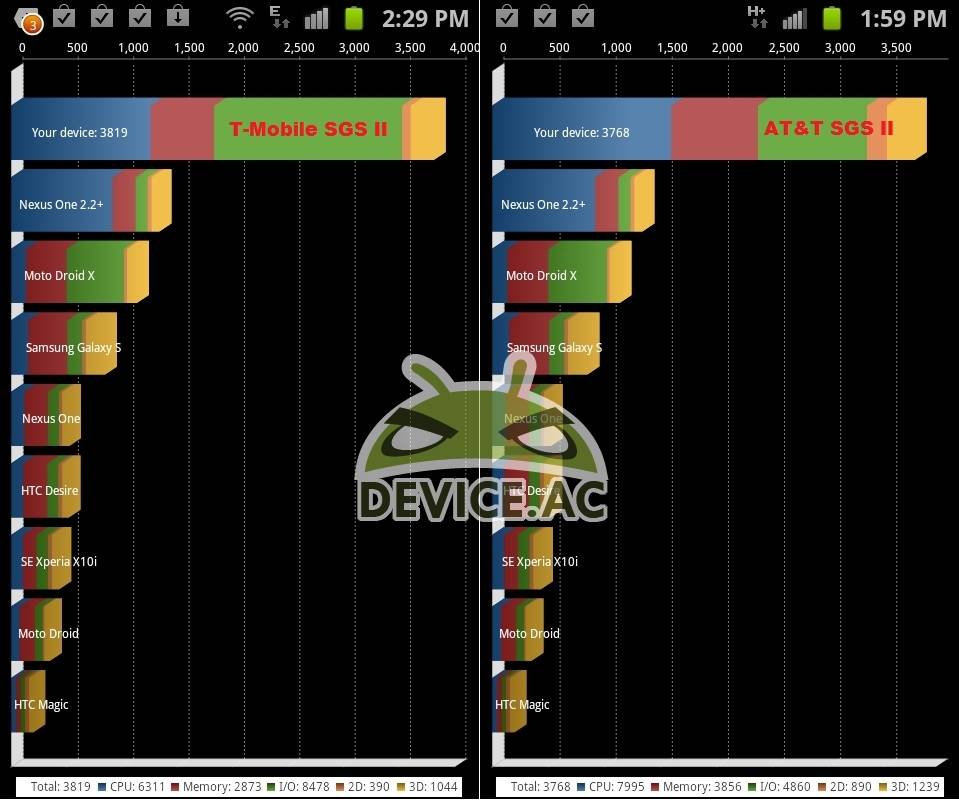
Today the Samsung Galaxy S II has just arrived for T-Mobile, while not available yet in stores we’ve been putting it through its paces and you can see our hands-on coverage here. We’ve also fully reviewed the AT&T Galaxy S II and that can be seen here. Today, just for a comparison we have a few screenshots of both running the popular benchmark Quadrant for everyone to enjoy, results can be seen below but lets just say this is one fast smartphone.
These phones are nearly identical (as are the other Galaxy S II’s) except the T-Mobile version comes with the Qualcomm 1.5 GHz dual-core processor and NOT the 1.2 GHz Samsung Exynos the AT&T and others carry. I was hoping to see a nice boost in performance from the upgraded processor but that just isn’t the case. Yes it is faster, but not by much. I ran a few tests on both smartphones and on average the T-Mobile SGSII scored around 3800. This is faster than any other phone on the market stock out of the box, so this is one extremely fast phone. It’s just the regular 1.2 GHz SGSII scores around 3700 stock, so the 1.5 GHz increase didn’t do all that much for performance, although I’m certainly not complaining.
Next I wanted to briefly mention the new HTC Amaze 4G, also with T-Mobile, we received it for some hands-on this morning too. The Amaze 4G sits nicely along with the Galaxy S II on T-Mobile and features the same 1.5 GHz dual-core Qualcomm processor. So what we have with the Amaze is a 4.3″ smartphone with the same 1.5 GHz processor, 1GB of RAM and all that jazz, yet it performs no where near as high as the Galaxy S II (in Quadrant at least). Some might say benchmarks don’t mean anything, and for many they don’t. As long as you have great overall performance that is smooth, fluid and runs great then who cares what the benchmarks say. The Amaze 4G scores around 2800 if its lucky in Quadrant, while the Galaxy S II scores around 3800. Pretty big difference right?
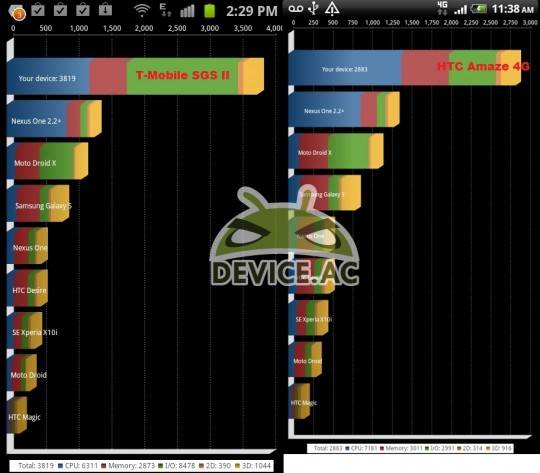
Clearly the HTC Amaze 4G with the same processor is severely lacking in regards to this benchmark. We could blame HTC, HTC Sense UI, or we could simply chalk this up to Samsung produces some excellent hardware and they tweak the OS to support the hardware at the same time. I’m not calling out HTC here, as Samsung has always performed very well in Quadrant results, but this just seems pretty crazy if you ask me. Could Sense UI cause benchmarks to suffer, although it makes the user interface smooth and clean, it’s a real possibility here.
This could also be because the EXT4 filesystem Samsung uses on their smartphones, if you look at the I/O performance, this is truly where Samsung shines and is able to squeeze out all that performance. Samsung scores 8400 while HTC scores 2900, as far as input and output performance Samsung clearly has an advantage here. I’m not going to read into all of this too much, and from initial thoughts both devices perform extremely well and just as a powerhouse dual-core smartphone should, I just thought I’d mention it for our readers. As a little bonus the DROID Bionic only scores 2700 in Quadrant with the TI OMAP 1.0 GHz dual-core it has on-board, just for a little more comparison.
What does everyone think here — Are benchmarks not nearly as important as we make them out to be? Or do they help sway your choices when considering a new smartphone? Feel free to leave a few thoughts or comments in the section below. We’ll have plenty of benchmark results from other apps in the full review of both these T-Mobiles phones coming soon, so stay tuned.
Full device specs can be found under the gallery below.
[device id=1661]
[device id=1422]
[device id=1659]


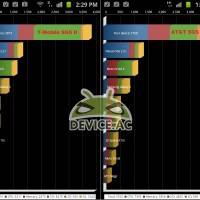
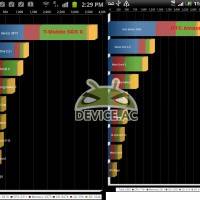
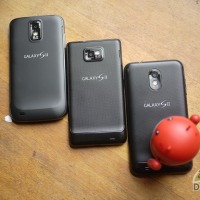
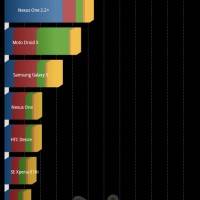








benchmarks don’t matter to the average user. most people only want to surf the internet, text, check e-mail, facebook, and play angry birds. if your phone can do that without stutter or lag they don’t care.
that’s why i wasn’t freaking out having a coronary when samsung put a different chip in the t-mobile version. as long as 1) the device is fast and 2) it performed similar to the other devices with the alleged better chip i didn’t care and i still don’t care. this phone will be a beast and that is the ONLY thing people should care about.
Vellamo tests overall performance including web browsing, page rendering and more and you can look forward to that in my full review. That is another good example of internet, text, email and what not like you just mentioned.
Thanks for reply
what I’d like is this phone on Verzion! Still leaves me scratching my head as to what is up with big red.
Verizon didn’t get the Sg s 2 because they are getting the nexus prime, they will have rights to that first. And I don’t benchmarks didn’t mean nothing either until I got a samsung epic touch 4g . You can tell right away my friend just how snappy and smooth the phone is. There is a reason it scores so high on the benchmark test. Overall usage on the phone compared to htc is much more fluid on the samsung. I had the 3d at first and sold it for the epic touch 4g. And my highest benchmark was 3905 right out the box.
Dope ass post!
Well, the problem with Quadrant is that with two phones with the same processors, the phone with the higher resolution will show a lower score. Since the higher resolution phone needs to render more pixels, the GPU benches slower. The Amaze has 134400 more pixels to render so those tests will come up as slower, therefor lowering the entire Quadrant score. I thought it was fairly well known that Quadrant puts maybe a little too much weight into the GPU tests.
I noticed that t-mobile’s GALAXY S II supports 3gp video playback, but NOT MP4, — at&t’s versionis just the reverse, they support mp4 but not 3gp, so as a t-mobile customer does that mean I WON’T be able to view any of my MP4 videos that my original galaxy s recorded?
I wonder what these Sammy devices would score on Quadrant if they weren’t capped at 60FPS?
Reviewer needs to realize that the 1.5ghz processor is NOT an “upgraded” processor. Just because it is a higher ghz chip, does not make it an upgrade.
That would be like saying a pentium 4 3.4ghz processor was an upgrade from a new core i7 2.6ghz processor.
The core i7 is INFINITELY faster than the p4 because of the architectural improvements inside of it.
The exynos chip blows the qualcom away in 3d processing and i believe it uses less battery power.
P4 was the king back in the day.. lol
@71d0e48c35c2d715918bd4e7d885406f:disqus Just like how Intel is just better than AMD right.. I completely understand trust me, just posting the results for everyone to enjoy.
I myself have an intel Quad-core core watercooled and heavily overclocked, but thanks for the reply I enjoy reading the comments.
Not at all like intel is better than amd. It’s like any processor from 2009 is inferior to any processor from 2011. The architecture changes and improves dramatically with every generation of chip. Whether you are talking computers or phones.
Mhz / Ghz do not matter anymore in the pc world. (well, they do, but they are irrelevant when comparing different generations of chip) and the same can be said for these phone chips.
Samsung has added a better graphics processing unit to the exynos chip. The Ghz hasn’t really changed form what was out from a year ago, but the graphics power has been boosted considerably.
For the day to day user making phone calls and checking facebook there is no difference in these 2 phones. Both are snappy and the user experience is great. But throw some 3d games at it and you wil see a difference. The real difference will be how these 2 perform in 9 months against each other as apps start being written for newer phones requiring more horsepower.
Sorry, not trying to be a jerk, but ghz is not king in electronics anymore. So much more goes into performance than just ghz.
Does anyone know if the T-mobile SGS2 (USA) has an FM radio? The European versions of both the S1 and S2 do, but the USA S1 does not.